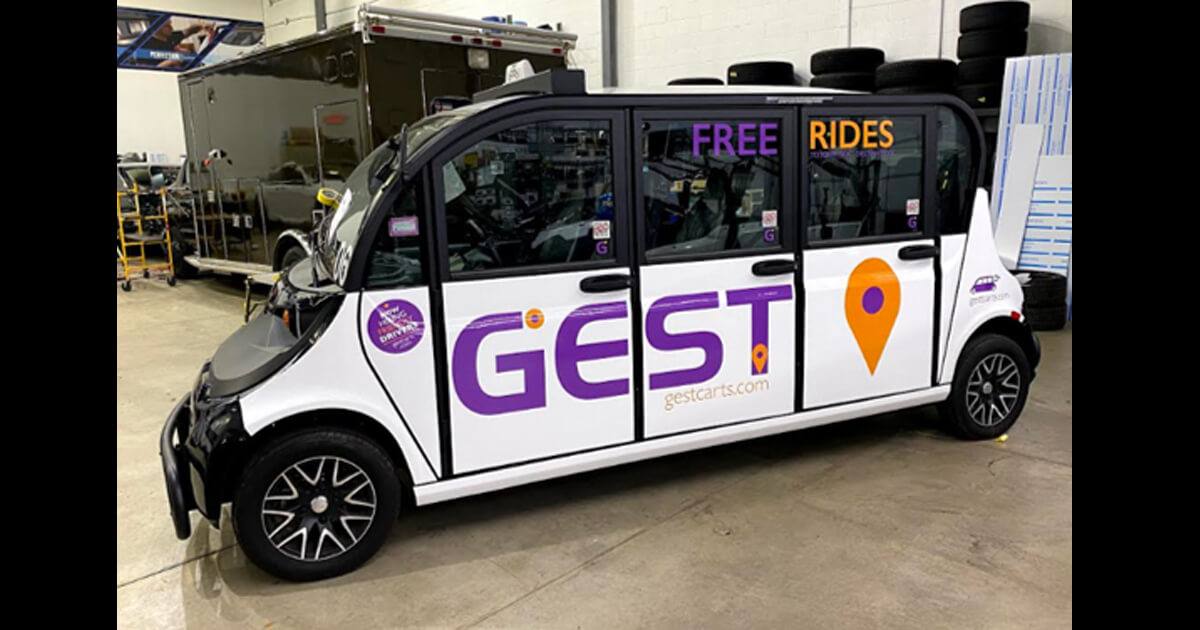Two Black-owned Mobility as a Service (MaaS) rideshare startups in Chicago aim to go all-in on adopting electric vehicles (EV). JitneyEV and GEST Carts Chicago operate with the mission of extending the benefits of the emerging green economy to communities that have traditionally borne a disproportionate environmental burden from heavy industry and urban development while reaping little or none of their advantages.
JitneyEV
JitneyEV is a division of the Bronzeville Community Development Partnership (BCDP), a nonprofit organization that promotes economic development and smart city initiatives for the greater Bronzeville area. A three-person operation, the Jitney EV management team is made up of General Manager William Billy Davis, Vice President for Strategic Partnerships Paula Robinson, and Vice President for Intergovernmental Affairs Bruce Montgomery.
As an all-EV MaaS rideshare operation, JitneyEV is laser-focused on the Bronzeville community in Chicago’s Near South Side. As a hyperlocal rideshare service, JitneyEV is an option for addressing the last mile gap between public transit stations and a final destination that may be several blocks or more than a mile away, while providing transportation to work, shopping, and entertainment to residents within its service area.JitneyEV and BCDP are collaborating with electric utility ComEd to implement the company’s Community of the Future program.
In 2017, BCDP and ComEd launched the DashEV pilot program, featuring a single all-electric Innova EV Dash model that achieves speeds of up to 35 miles per hour, with a 150-mile range per charge of its lithium-ion battery. While COVID has hampered expansion beyond the pilot, JitneyEV plans to launch as a full-scale service once the pandemic ends, promoting broader job opportunities in the green economy for Bronzeville residents, according to Davis. We want to advocate for beneficial electricity and mobility, Davis told The Plug. Renewable energy policies that result in a clean, healthy environment, so our work is very much steeped into clean energy.
There’s a strong, clean energy ecosystem that is taking root in Black and brown communities that are pushing the ball forward, Davis said, adding that JitneyEV’s advocacy extends beyond transportation and the company is involved and engaged in trying to push the ball forward collectively.JitneyEV has developed a number of educational resources, including an EV 101 guide and a Q&A section describing the basics of electric vehicles, information on locating available public charging stations in the area and how-to’s on installing residential EV charging stations.
We see the connectivity from transportation to charging infrastructure and to smart communities. When we do reach the next phase of this transition when technology takes us from mobility to autonomous vehicles and connected cars, we want Black and brown communities to already have the infrastructure and engagement to benefit from that transition, Davis said. [The community will] fully enjoy healthy, cleaner air, healthier environment, lower incidences of asthma and lung disease that will result from those clean energy policies.
GEST Carts Chicago
Green Easy Safe Transportation (GEST) Carts was launched in Cincinnati in 2018 and has since expanded its operations to Detroit and Chicago. All three cities operate fleets of zero-emission all-electric vehicles.GEST Carts Chicago opened in November 2020, with shared ownership between Tiffany Shepard, who is Head of Marketing and Partnerships, Harold Shepard, Head of Sales and Operations, and Marissa Wright, Head of Marketing and Partnerships. Like JitneyEV, GEST Carts Chicago is based in Bronzeville.
The company presently operates four vehicles, with rides limited to the West Loop area near downtown. While our carts are perfectly suited to shuttle people around the West Loop who were out going to restaurants and socializing or bar hopping or all of that, we have a personal goal of also assisting in some of these other neighborhoods, Shepard told The Plug.
By day we could be assisting a retirement home with getting people to get vaccines or getting their groceries. And then by night, we could be helping people bar-hopping in Wrigleyville. When Shepard saw a prototype GEST vehicle drive by as she was walking down the street in Cincinnati, she was inspired to bring the company to Chicago. She approached the owners of the Cincinnati GEST outpost and asked about possible expansion.
However, the Cincinnati company was still in its startup phase. But a year later, the owners approached her and asked if she was interested in establishing a franchise in Chicago. She did, recruiting her brother and Wright to join her as co-founders for the new venture. The company eventually plans to expand into new neighborhoods, two cars at a time, as new advertisers and sponsors sign-on, according to Shepard, who is enthusiastic about the reception the company has received and the prospect of expanding zero-emission transportation into Black and Brown areas of the city.
In recent years, sales of EVs have increased, according to the EV Adoption organization. In Illinois alone, annual sales of electric vehicles jumped from 3,812 in 2017 to 7,317 in 2018. The city is excited about us. The state’s excited about us because just generally getting minorities and lower-income communities to embrace electric vehicles, has in my understanding, has been a little bit more of a struggle because there’s a stigma of electric vehicles being more expensive, Shepard said, adding that this could be a good way to increase buy-in for EVs in communities where their presence is minimal.
Each six-passenger GEST Chicago cart resembles a golf cart, but with doors, and is wrapped in advertising featuring one or more sponsor organizations. . Advertising revenue covers overhead costs and allows GEST Carts Chicago to offer rides at no charge. Although they are capable of higher speeds, the carts travel no faster than 25 miles per hour on city streets by request from city officials, Shepard said. Unlike drivers for services like Lyft and Uber, GEST Carts Chicago drivers are part-time employees, not contractors. Each driver must hold a chauffeur’s license and undergo additional specialized training. In exchange, drivers are paid above minimum wage and are allowed to keep 100%t of their tips, according to Shepard.
Like many ventures, GEST Carts Chicago has faced challenges due to COVID-19, but the pandemic has also provided the company with opportunities to reach out, according to Shepard. We’re really big on helping people that look like us and helping communities that look like us. Even during the pandemic, we were super excited about trying to help elderly people, maybe get to doctor’s appointments, get to grocery stores and now with the vaccine possibly transporting people back and forth [to appointments], Shepard said.
Both JitneyEV and GEST Carts Chicago reflect initiatives by Black-owned companies to tap into the growing presence of electric vehicles on the road and promote adoption by Black drivers. The companies also represent the potential for much-needed opportunities for local residents to obtain clean energy jobs while providing transportation without adding carbon emissions.








